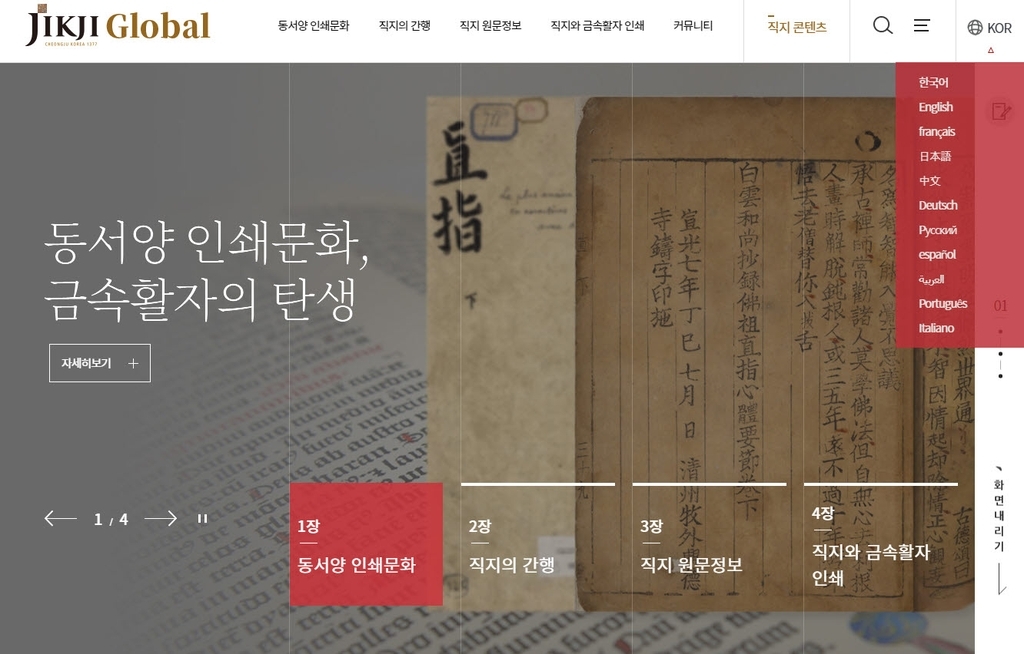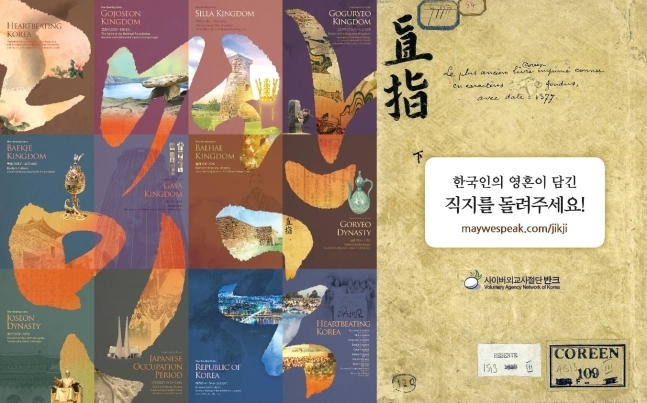Website for oldest metal-printed book opens in multiple languages
By Im Eun-byelPublished : Nov. 27, 2020 - 15:21

Korea is set to call on the retrieval of Jikji, the world’s oldest metal-printed book currently stored in France, with a new official website and other promotional activities.
Jikji refers to a Korean Buddhism document printed at the temple Heungdeoksa in 1377 during the Goryeo Kingdom (918-1392). It was printed 78 years prior to Gutenberg’s 42-line Bible. Jikji was listed in the UNESCO Memory of the World Register in 2001. Brought to France at the end of the 19th century, one sole copy of Jikji is currently stored at the National Library of France.
Cheongju county in North Chungcheong Province announced Friday it has opened a global website for Jikji that introduces the history and information related to the metal-printed book in 11 languages: Korean, English, French, German, Spanish, Japanese, Chinese, Russian, Arabic, Portuguese and Italian.
It also offers high-resolution original images of Jikji, provided by the French National Library in an e-book form.
Jikji refers to a Korean Buddhism document printed at the temple Heungdeoksa in 1377 during the Goryeo Kingdom (918-1392). It was printed 78 years prior to Gutenberg’s 42-line Bible. Jikji was listed in the UNESCO Memory of the World Register in 2001. Brought to France at the end of the 19th century, one sole copy of Jikji is currently stored at the National Library of France.
Cheongju county in North Chungcheong Province announced Friday it has opened a global website for Jikji that introduces the history and information related to the metal-printed book in 11 languages: Korean, English, French, German, Spanish, Japanese, Chinese, Russian, Arabic, Portuguese and Italian.
It also offers high-resolution original images of Jikji, provided by the French National Library in an e-book form.

Meanwhile, the Voluntary Agency Network of Korea, a civic cyberdiplomacy organization of Korea, has declared it will launch a global campaign to retrieve Jikji. It also posted a new petition titled “Bring Jikji to the World!” at Change.org, a global online petition platform.
According to VANK, the National Library of France has been keeping Jikji in storage without public exhibition.
“France is completely blocking the opportunity for the humanity to encounter Jikji, to learn from it, and to lead to new challenges and creativity,” the post read. “We want to properly study the value of Jikji, a UNESCO Memory of the World, and as a future generation, we want to learn and engage in creative activities.”
VANK called for the French government and national library to “properly study and display Jikji” and to “return or lend Jikji to Korea so that Koreans can encounter and understand the roots of their culture.”
By Im Eun-byel (silverstar@heraldcorp.com)








![[Kim Seong-kon] Democracy and the future of South Korea](http://res.heraldm.com/phpwas/restmb_idxmake.php?idx=644&simg=/content/image/2024/04/16/20240416050802_0.jpg&u=)








![[KH Explains] Hyundai's full hybrid edge to pay off amid slow transition to pure EVs](http://res.heraldm.com/phpwas/restmb_idxmake.php?idx=652&simg=/content/image/2024/04/18/20240418050645_0.jpg&u=20240418181020)

![[Today’s K-pop] Zico drops snippet of collaboration with Jennie](http://res.heraldm.com/phpwas/restmb_idxmake.php?idx=642&simg=/content/image/2024/04/18/20240418050702_0.jpg&u=)